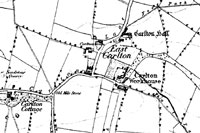THEY LIVED IN LEEDS
Benjamin Brooke (1793-1851)
Headingley Schoolmaster and Overseer of the Poor.
 In the 1830s and 40s Benjamin Brooke played a key role in the township of Headingley as schoolmaster, parish clerk and most significantly as assistant overseer of the poor. Not only was he responsible for teaching the village children and dealing with parish affairs but in his hands lay the day-by-day administration of the ancient and complex system for dealing with the poor and destitute in the whole of the township, which at that time included Burley and Kirkstall.
In the 1830s and 40s Benjamin Brooke played a key role in the township of Headingley as schoolmaster, parish clerk and most significantly as assistant overseer of the poor. Not only was he responsible for teaching the village children and dealing with parish affairs but in his hands lay the day-by-day administration of the ancient and complex system for dealing with the poor and destitute in the whole of the township, which at that time included Burley and Kirkstall.
Benjamin Brooke was born in 1793, the son of Joseph Brooke, master of the small charity school built in 1783 on the village green near St Michael’s Church – the origin of the later school building now used as the Parish Centre. Joseph, as an educated man, also acted as overseer of the poor for the township, and at the annual township meetings was sometimes elected to take on other (unpaid) jobs too, as local ‘surveyor of the highways’ or constable (no police force then). The family lived in the small house attached to the school, with a stable and garden behind and that is where Benjamin was born. When Joseph retired in 1825 – rewarded by a silver cup for his 40 years of ‘faithful and upright’ service – Benjamin followed him both as schoolmaster and overseer, as well as serving as parish clerk at St Michael’s and occasionally as constable. When the job of assistant overseer became salaried he took it on full-time in 1835, retiring from teaching and moving to a house next to the church. It was clearly a role he relished and it certainly gave him considerable power.
As overseer he was responsible for collecting the poor rate and other local rates from eligible residents and for assessing need. Headingley was not an area of desperate poverty or high unemployment but he had to keep a tight hold on the purse-strings. He had to check who was eligible for relief through ‘settlement’ in the township (a complex matter), and arrange for paupers or vagrants from elsewhere who sought help to be sent back to the parish responsible for them. He dealt with issues of destitute children born out of wedlock and where possible pursued the fathers for support – difficult as many fled elsewhere to escape liability. He had to investigate and assess every claim for relief. His aim was to pay the minimum – one sick man with a wife and four children, for example, got 6 shillings a week (about £15 in modern terms) to feed and house the family. This was about half the average labourer’s wage.
Two cottages in Far Headingley were rented as housing for paupers, but people incapable of work - the old, the sick and the insane - were sent to the workhouse. Headingley was then part of the huge Wharfedale Union, so they had to go to the Union’s workhouse at Carlton, far away across the fields near Guiseley. It was unhealthy and overcrowded, with only primitive facilities, particularly for the insane, who at worst could be tied up in what was called the ‘black hole’ – easy to imagine the horror of this. It was said that many poor people endured terrible conditions in their own homes, but feared being sent to the workhouse, even in one case to the point of suicide.
Benjamin Brooke was one of the overseers who gave evidence in 1832 to the Commissioners for the Poor Laws appointed by Parliament to report on current practice and recommend changes. His report gives us an insight into his work. He believed in trying to keep families together and find work for the unemployed whenever possible, for example stone-breaking for the roads. He aimed to treat the most unfortunate with humanity, and even ‘the dissolute and abandoned’ were not ‘suffered to starve’. He paid 1 penny a week to enable a workhouse child to go to school. But his general attitude was tough as he had to account to the local ratepayers: he pursued those who tried to cheat the system and brought several culprits before the magistrates. He was praised for his efficiency and honesty. However, he was later rebuked by the Poor Law Commissioners for his rough treatment of a couple who had applied to him for help: ‘harshness of manner and severity of language are to be avoided’ he was told. Times were changing.
He remained in post until his sudden death in 1851. Just a minor official, he represents an almost forgotten aspect of local life which was soon outmoded. In 1869, after the break-up of the Wharfedale Union, Headingley together with adjoining townships was incorporated into the Leeds Union, with its huge newly-built workhouse in Beckett Street (now the Thackray Museum), and new Guardians of the Poor were appointed. The workhouse at Carlton, described as ‘wholly inadequate and insufficient in every respect’, was demolished. No trace of it remains.
Eveleigh Bradford
November 2010 (revised 2016)